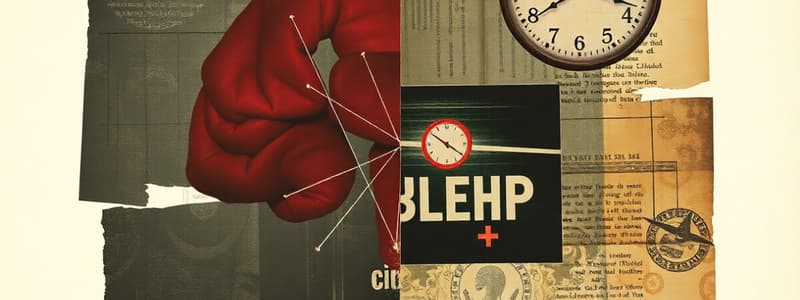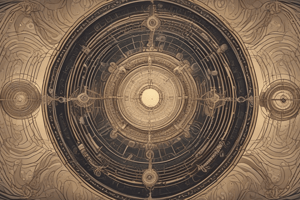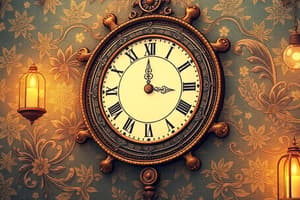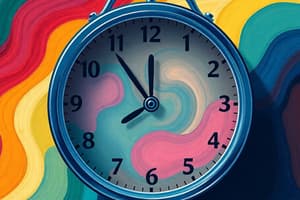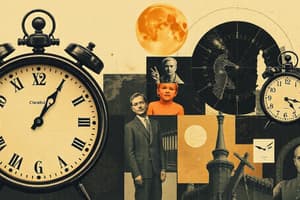Podcast
Questions and Answers
The body's biological clock is located in the ______.
The body's biological clock is located in the ______.
- hypothalamus (correct)
- hippocampus
- thalamus
- pituitary gland
______ occurs when there is a chronic deficiency in sleep.
______ occurs when there is a chronic deficiency in sleep.
- sleep debt (correct)
- rotating shift work
- circadian rhythm
- jet lag
______ cycles occur roughly once every 24 hours.
______ cycles occur roughly once every 24 hours.
- conscious
- biological
- circadian (correct)
- rotating
______ is one way in which people can help reset their biological clocks.
______ is one way in which people can help reset their biological clocks.
The ______ plays a role in controlling slow-wave sleep.
The ______ plays a role in controlling slow-wave sleep.
______ is a hormone secreted by the pineal gland that plays a role in regulating biological rhythms and immune function.
______ is a hormone secreted by the pineal gland that plays a role in regulating biological rhythms and immune function.
______ appears to be especially important for enhanced performance on recently learned tasks.
______ appears to be especially important for enhanced performance on recently learned tasks.
______ is(are) described as slow-wave sleep.
______ is(are) described as slow-wave sleep.
Sleep spindles and K-complexes are most often associated with ______ sleep.
Sleep spindles and K-complexes are most often associated with ______ sleep.
Symptoms of ______ may be improved by REM deprivation.
Symptoms of ______ may be improved by REM deprivation.
The ______ content of a dream refers to the true meaning of the dream.
The ______ content of a dream refers to the true meaning of the dream.
______ is loss of muscle tone or control that is often associated with narcolepsy.
______ is loss of muscle tone or control that is often associated with narcolepsy.
An individual may suffer from ______ if there is a disruption in the brain signals that are sent to the muscles that regulate breathing.
An individual may suffer from ______ if there is a disruption in the brain signals that are sent to the muscles that regulate breathing.
The most common treatment for ______ involves the use of amphetamine-like medications.
The most common treatment for ______ involves the use of amphetamine-like medications.
______ is another word for sleepwalking.
______ is another word for sleepwalking.
______ occurs when a drug user requires more and more of a given drug in order to experience the same effects of the drug.
______ occurs when a drug user requires more and more of a given drug in order to experience the same effects of the drug.
Cocaine blocks the reuptake of ______.
Cocaine blocks the reuptake of ______.
______ refers to drug craving.
______ refers to drug craving.
LSD affects ______ neurotransmission.
LSD affects ______ neurotransmission.
______ is most effective in individuals that are very open to the power of suggestion.
______ is most effective in individuals that are very open to the power of suggestion.
______ has its roots in religious practice.
______ has its roots in religious practice.
Meditation may be helpful in ______.
Meditation may be helpful in ______.
Research suggests that cognitive processes, such as learning, may be affected by ______.
Research suggests that cognitive processes, such as learning, may be affected by ______.
Flashcards
Biological clock location
Biological clock location
The hypothalamus in the brain acts as the body's biological clock.
Sleep deficiency symptom
Sleep deficiency symptom
Chronic sleep deficiency leads to sleep debt.
Circadian cycle duration
Circadian cycle duration
Circadian cycles are roughly 24 hours long.
Biological clock reset method
Biological clock reset method
Signup and view all the flashcards
Growth hormone secretion location
Growth hormone secretion location
Signup and view all the flashcards
Slow-wave sleep controller
Slow-wave sleep controller
Signup and view all the flashcards
Pineal gland hormone
Pineal gland hormone
Signup and view all the flashcards
Sleep stage for enhanced learning
Sleep stage for enhanced learning
Signup and view all the flashcards
Slow-wave sleep stages
Slow-wave sleep stages
Signup and view all the flashcards
Sleep stages with spindles & complexes
Sleep stages with spindles & complexes
Signup and view all the flashcards
Possible REM deprivation benefit
Possible REM deprivation benefit
Signup and view all the flashcards
Dream meaning (true)
Dream meaning (true)
Signup and view all the flashcards
Narcolepsy muscle control loss
Narcolepsy muscle control loss
Signup and view all the flashcards
Sleep apnea brain signal disruption
Sleep apnea brain signal disruption
Signup and view all the flashcards
Narcolepsy treatment method
Narcolepsy treatment method
Signup and view all the flashcards
Sleepwalking term
Sleepwalking term
Signup and view all the flashcards
Drug effect increase need
Drug effect increase need
Signup and view all the flashcards
Cocaine neurotransmitter block
Cocaine neurotransmitter block
Signup and view all the flashcards
Drug craving term
Drug craving term
Signup and view all the flashcards
LSD neurotransmitter affect
LSD neurotransmitter affect
Signup and view all the flashcards
Hypnosis use effectiveness
Hypnosis use effectiveness
Signup and view all the flashcards
Meditation root
Meditation root
Signup and view all the flashcards
Meditation use
Meditation use
Signup and view all the flashcards
Learning affect
Learning affect
Signup and view all the flashcards
Study Notes
Biological Clocks and Sleep
- The body's biological clock is located in the hypothalamus.
- Sleep debt occurs when there's a chronic sleep deficiency.
- Circadian cycles occur roughly every 24 hours.
- Light-dark exposure is a way to reset biological clocks.
- The hypothalamus plays a role in controlling slow-wave sleep.
Hormones and Biological Rhythms
- Melatonin is a hormone secreted by the pineal gland, regulating biological rhythms and immune function.
- Slow-wave sleep is important for enhanced performance on recently learned tasks.
- Stages 3 and 4 of sleep are described as slow-wave sleep.
- Sleep spindles and K-complexes are most often associated with stage 2 sleep.
Sleep Disorders and Treatments
- Cataplexy is loss of muscle tone associated with narcolepsy.
- Obstructive sleep apnea occurs due to disruptions in signals to the muscles that control breathing.
- Sleep apnea treatments may involve the use of amphetamine-like medications.
- Sleepwalking (somnambulism) is another word for sleepwalking.
- Tolerance is when a drug user needs more of a drug to experience the same effect.
Neurotransmitters and Drug Effects
- Cocaine blocks the reuptake of dopamine.
- Psychological dependence refers to drug craving.
- LSD affects dopamine and serotonin neurotransmission.
- Hypnosis is most effective in individuals open to suggestion.
Meditation and Cognitive Processes
- Meditation may be helpful for pain management and stress control.
- Cognitive processes such as learning may be affected by hypnosis, meditation, or mindful awareness.
Studying That Suits You
Use AI to generate personalized quizzes and flashcards to suit your learning preferences.
